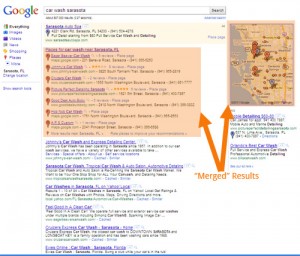
Google Places Listings in Search Results
While Google Places is most important if you’re serving one or more local markets, every business should have (and use!) at least one listing on Google Places. If you don’t have yours set up yet, these instructions will help you get started.
One you have your listing, however, how do you make sure it has good positioning in the search results?
Like any web property, your Google Places listing will improve in the search rankings when there are links to it. Any link will do, but an “anchor text” link will be even more effective. The secret of finding the URL (or address to link to) for your Google Places page is coming up in a minute. But first…
What is an “Anchor Text” Link?
Here’s a quick primer on the 2 basic types of links you can create (or receive) on the web. To illustrate, I’m going to refer to the product we recently released: The Ultimate Small Business Growth Kit in a Box …Without the Box!
I could send you to go look at this product on the web by providing a link directly to its address:
http://www.epiphanymarketing.com/the-ultimate-small-business-growth-kit-in-a-box-without-the-box/
Now… that’s an effective link (please feel free to share it with anyone & everyone!), but it’s a little lengthy and not very pretty… wouldn’t you agree?
A more appealing way to create the link is to use “anchor text.” Anchor text is the term for the word or phrase that is linked to content on the web. In the link above, there is no anchor text (OK… technically there is, but it’s identical to the URL so we won’t count it).
In the case of our product, a phrase that could be used to describe our kit might be:
incredibly valuable real-world marketing training
(Yes… I’m biased, but that doesn’t make me wrong!)
So here’s what a link might look like using anchor text: Please check out our incredibly valuable real-world marketing training for the 21st Century Small Business.
When you’re creating (or receiving) links on the web, the links will be of more value if they are anchor text links. The key is: the anchor text should be the phrase you’d like to see your content rank well on in the search results.
In other words, if I got more links just like the one above, I might expect the page containing our training program to rank well in Google search results for the phrase “incredibly valuable real-world marketing training.”
So… if you have a pest control business in Topeka, then you might want your Google Places page to rank well on the phrase “pest control Topeka.” In that case, you’d want other websites to link to your Google Places page using that phrase as the anchor text. Make sense?
How to Find the Real URL for Your Google Places Page
This is a little bit tricky. In most cases, when you visit your Google Places page, you’re actually going to be arriving on the page from a Google search. So… if you copy/paste the URL (or even use the “link” tool that Google provides you on the page), you’re going to have a really long URL that contains a whole bunch of data… including the specific search term you used. This won’t help you very much. So here’s the trick to it:
Search for your business on the map by going here.
Once you see the listing for your business… right-click on the link and choose “Open Link in New Window” or “Open Link in New Tab.” In most modern browsers, you should see one or both of those choices. The page that opens (in the new window or new tab) will have a URL that looks something like this:

In our case, http://maps.google.com/maps/place?cid=17650561483947767278&q=blablablablablablabla with a whole bunch of characters and stuff afterward.
The key is to highlight everything starting from the “http” on the left all the way through the series of numbers that comes after “cid” on the right. Stop when you see the ampersand (“&”) character. Like this:

That means for us, I’m grabbing this: http://maps.google.com/maps/place?cid=17650561483947767278
If the anchor text for us is “small business marketing strategists,” then here’s what a link would look like: small business marketing strategists. In the case of one of our good friends here in town, it might be acupuncture Sarasota.
This little-known secret about the actual URL for your Google Places page can be incredibly helpful… we’ll talk more about this in a future update! Feel free to post your questions in the comments.

Is it better for your rankings to link to the places page with good anchor text or is it better to link to the normal homepage of the website with good anchor text to rank high on Google Places? What is the most effective situation?
Hi James,
Great questions! This isn’t really an “either/or” situation. Without good content, neither the Google Places page nor the website will rank well. So… the keyword phrase(s) you’re targeting need to prominently appear in both the website and the Places page. Once that’s in place, anchor text links to the website itself would be my first priority. You definitely need to verify that the website URL listed in the Google Places page matches up to the website you are trying to rank. Then, some anchor text links to the Google Places page as we’ve described here will help things along.
There are certainly other factors… reviews (directly on Google Places as well as on other sites that Google is likely to pick up on as we described in this webinar on local business marketing) will be helpful as will strategic categorization of the business in Google Places. Adding images and YouTube clips to the Google Places page have all had a measurable impact as well.
Hope this helps!